The grey-headed flying-fox is facing increasing threats and an uncertain future.

AS HE SUN dips below the far horizon, a small crowd – gathered on a hill to view the sunset silhouette the Melbourne skyline – starts drifting away. If only they’d waited another 15 minutes they’d have witnessed an even greater spectacle than just another sunset over a big city – the daily exodus of up to 50,000 grey-headed flying-foxes from their urban sanctuary to Melbourne’s suburbs and beyond.
“I don’t think most people appreciate how lucky we are to have this right on our doorstep, just 5km from the city,” says Stephen Brend, the Parks Victoria ranger responsible for the flying-foxes at Yarra Bend Park. “What an incredible spectacle it is to witness flying mammals, some with wingspans of more than a metre, crossing a major city at night. I’ve worked all over the world and seen the animal migrations in Africa, but this flyout is certainly one of my favourite wildlife experiences – and it’s so easily accessible.”
Also known as a fruit bat, the grey-headed flying-fox is a megabat and one of four mainland flying-fox species found in Australia. The others are the black flying-fox, spectacled flying-fox and little red flying-fox.
Apart from an obvious size disparity, flying-foxes differ in many ways from smaller microbat species. “Most smaller bats tend to roost in dark places such as caves, mines, tree hollows and under bark, and rely on echolocation to navigate and find food – usually insects,” explains Dr Justin Welbergen, animal ecologist at the Hawkesbury Institute for the Environment, Sydney, and president of the Australasian Bat Society. “Many of the smaller species don’t travel long distances in search of food but rather go into torpor when supplies are low.
This story is from the {{IssueName}} edition of {{MagazineName}}.
Start your 7-day Magzter GOLD free trial to access thousands of curated premium stories, and 9,000+ magazines and newspapers.
Already a subscriber ? Sign In
This story is from the {{IssueName}} edition of {{MagazineName}}.
Start your 7-day Magzter GOLD free trial to access thousands of curated premium stories, and 9,000+ magazines and newspapers.
Already a subscriber? Sign In

SULAWESI SENSATIONS
There are worlds within worlds and marvels untold waiting to be experienced on Indonesia's remote islands.
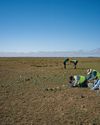
SEARCHING FOR AUSSIE DINOSAURS
Our understanding of where to find ancient life in Australia has been turned on its head by a new appreciation of the country's geology. Now the world is looking to our vast outback as the latest hotspot to locate fossils.

THE HARDEST NIGHT
The first Australian ascent of Mt Everest in 1984 is one of the great feats of mountaineering. Climbed by a small team semi-alpine style, with no bottled oxygen, via the Great (Norton) Couloir, it remains unrepeated 40 years later.
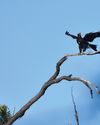
WEDGE-TAILED WONDER
The chance discovery of an eagle nest leads to an extended vigil observing normally hidden behaviours of one of nature's supreme winged marvels.
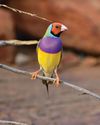
BURDENED BY BEAUTY
Northern Australia's Gouldian finch survives in huge numbers in cages around the world, but its wild population continues to struggle.

A TELESCOPE FOR A GOLDEN AGE
After a stellar 50 years as one of the country's major scientific assets, the AAT continues to play a major role in keeping Australian astronomy on the world stage.
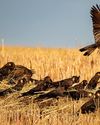
COCKY WHISPERING AT COOMALLO CREEK
This patch of remnant bush on the edge of the West Australian wheatbelt is a place loved by one of Australia's rarest bird species and the man who has studied the site for more than 50 years.

A PIONEERING PAIR
Louisa Atkinson and her mother, Charlotte, were among Australia's earliest authors, and pioneers in women's rights.

THE LONGEST WALK
Lucy Barnard is walking from Argentina to Alaska -the length of the Americas - on an extraordinary journey of endurance and adventure.
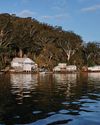
SECLUDED, BUT NOT ALONE
In an era of heightened social isolation, where many of us lead lonely lives, Dangar Island offers the chance to be part of a supportive, connected community.